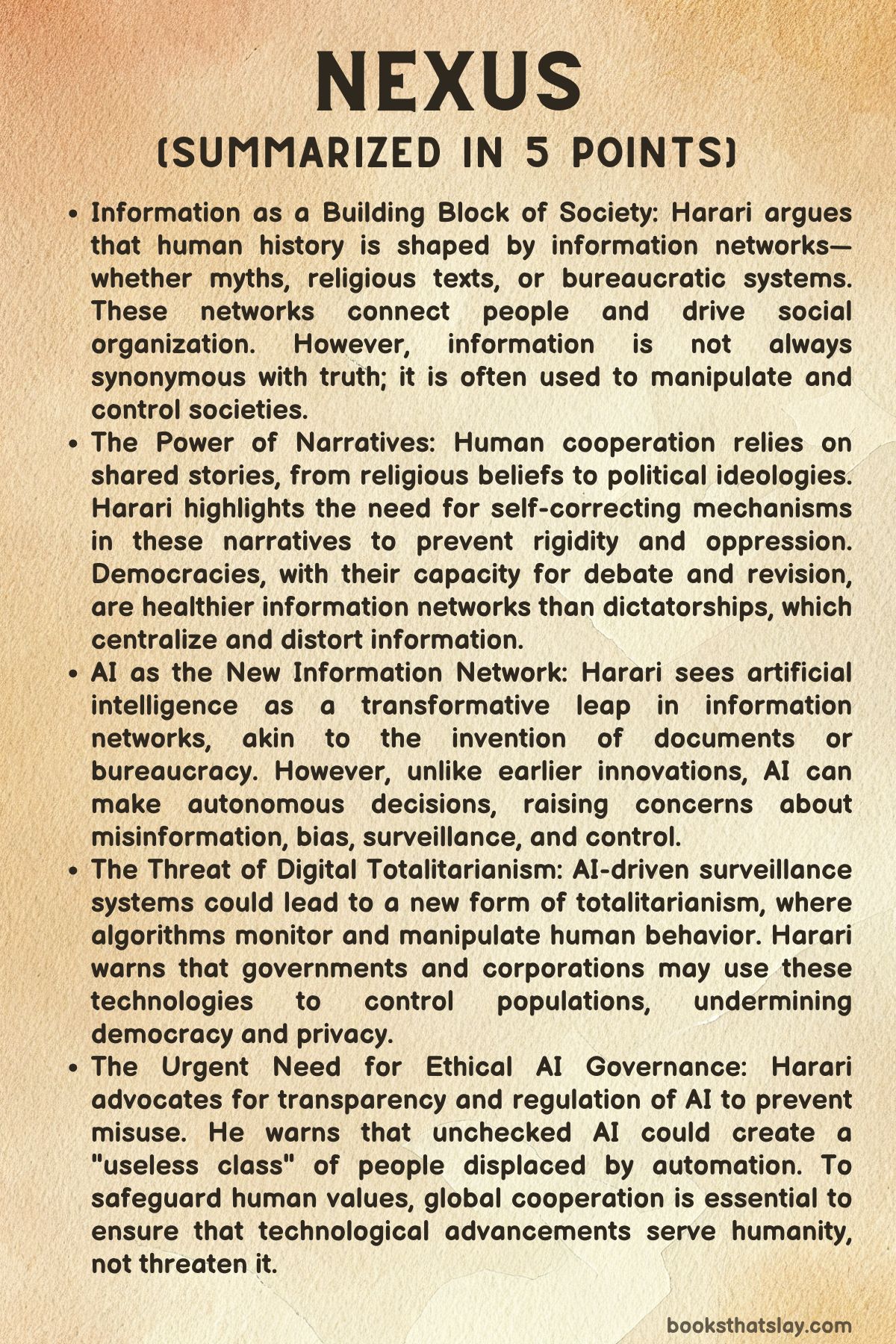Nexus by Yuval Noah Harari Summary, Analysis and Themes
Nexus: A Brief History of Information Networks from the Stone Age to AI by Yuval Noah Harari delves into humanity’s relationship with information throughout history, from ancient myths to modern-day artificial intelligence.
Harari argues that information networks—whether in the form of religious texts, political systems, or digital algorithms—have always shaped human societies by connecting people and driving progress. However, he warns that today’s rapid advancements in AI pose unprecedented existential threats. Through historical analysis and contemporary insights, Harari explores how the spread and control of information shape truth, power, and the future of humanity.
Summary
In Nexus, Yuval Noah Harari explores how information has shaped human history and how the current rise of artificial intelligence (AI) presents both unprecedented challenges and opportunities for humanity.
He begins by examining humanity’s long history of creating information networks, such as myths, religious texts, and bureaucratic systems, which have connected people and shaped societies. These networks have enabled humans to cooperate in large numbers, a key factor in our evolutionary success.
However, Harari warns that information is not synonymous with truth. Throughout history, people have used information to create narratives that shape reality—sometimes for good, but often for manipulation and control.
Harari outlines the importance of stories in organizing societies, noting that humans use narratives to create meaning and promote cooperation. From religious texts like the Bible to political ideologies like Stalinism, narratives have shaped human behavior by connecting people around shared beliefs.
Harari emphasizes that these narratives must include self-correcting mechanisms, like amendments in modern democracies, to adapt to changing realities. Without such mechanisms, societies risk becoming rigid and oppressive, as seen in authoritarian regimes.
Harari contrasts democratic information networks, which thrive on debate and correction, with dictatorial ones, which centralize information and resist change.
The first major leap in human information networks came with the invention of documents, which allowed for more complex bureaucratic systems. Harari highlights how these early bureaucracies shaped civilizations and compares them to today’s AI-driven information systems.
Just as documents once transformed governance, AI is reshaping how societies function. However, unlike documents, AI has the potential to make autonomous decisions, raising serious concerns about control, bias, and surveillance. Harari warns that AI could amplify misinformation, undermine democracy, and lead to digital totalitarianism.
He cites the example of Facebook’s role in spreading misinformation during the Rohingya crisis in Myanmar, where algorithms inadvertently fueled violence and hate.
In the present day, Harari argues, AI is revolutionizing the way societies function, much like the Industrial Revolution transformed economies. However, he expresses concern about the speed of this transformation and its impact on human autonomy and democracy.
He warns of an AI-driven surveillance state, where governments and corporations can monitor citizens at all times through algorithms that predict and manipulate behavior.
Harari compares this to historical dictatorships, where information control was key to maintaining power. Today, the scale of digital surveillance is unprecedented, making it possible for authoritarian governments to achieve total control.
Looking to the future, Harari explores the moral dilemmas posed by AI.
He warns that autonomous weapons, self-driving cars, and algorithms that govern financial and legal decisions all present ethical challenges that must be addressed.
He urges societies to create transparent systems that prioritize human welfare. He also highlights the danger of creating a “useless class” of people displaced by automation, raising questions about purpose and meaning in a world dominated by machines.
In conclusion, Harari calls for humanity to confront these challenges with vigilance and care. He believes that global cooperation is essential to regulate AI and prevent its misuse.
Ultimately, Nexus is a call to action for societies to balance technological advancement with human values, ensuring that the future remains one in which humans—not machines—make the most important decisions.

Analysis and Themes
The Power of Information Networks
Yuval Noah Harari’s Nexus delves into how the evolution of technology has fundamentally altered human existence. Harari presents technology not merely as a tool that humans have created, but as an active force that has shaped human societies, interactions, and even consciousness.
Throughout history, key technological milestones such as the Cognitive Revolution, the Agricultural Revolution, and the Industrial Revolution have driven humanity to new levels of societal organization and power. These advancements were not just responses to human needs, but also agents that propelled societies forward by reshaping environments, relationships, and even ways of thinking.
The plow and irrigation systems, for instance, didn’t merely increase agricultural output—they reorganized entire social structures, established hierarchies, and paved the way for the rise of empires, religions, and legal systems. Harari argues that technology’s role is not passive but actively influences human societies, transforming not just how people live, but the very way they perceive the world and their place within it.
The Psychological and Societal Impact of Technological Unemployment in the Age of Automation and AI
The rapid evolution of technology, particularly with the rise of automation and artificial intelligence (AI), has led to widespread anxiety regarding job displacement and the loss of identity. Harari draws a parallel between the fear felt by workers during the Industrial Revolution and the modern-day fears of workers whose jobs are threatened by AI and automation.
This fear, however, is not solely about economic survival; it is deeply psychological. Just as the Luddites of the 19th century feared the loss of their social identity and sense of purpose due to the rise of machines, modern workers share a similar dread about becoming obsolete.
Harari underscores the implications of this shift on a deeper level, questioning what happens to human identity in a world where machines can think, decide, and create independently. As machines take on more tasks traditionally performed by humans, society must confront not only the economic challenges of automation but also the existential crisis it may create.
This dilemma forces humanity to redefine its relationship with work and productivity, raising essential questions about the role of humans in a future dominated by machines.
Ethical Quandaries in the Age of Algorithms and the Loss of Free Will
One of the most pressing concerns in Nexus is the growing influence of algorithms and data-driven systems in shaping human behavior and decision-making. Harari paints a chilling picture of a world where algorithms not only predict and manipulate human actions but are the unseen forces guiding choices in everything from politics to consumer behavior.
In his analysis, Harari reflects on the 2016 U.S. presidential election, illustrating how political campaigns used psychographic profiling and data mining to craft personalized ads that played on voters’ emotions, thus influencing electoral outcomes. The key issue here is whether humans still possess free will in an era where algorithms make decisions for us.
Harari argues that if algorithms can predict, shape, and manipulate our behaviors, then they may ultimately strip us of agency. This loss of free will, combined with the ethical concerns about the potential for manipulation, calls for a serious rethinking of how data and algorithms are used in society.
The ethical implications of AI’s role in shaping human decisions thus extend far beyond individual cases and challenge the very notion of autonomy and freedom in a technologically mediated world.
A Brave New World of Eugenics
In Nexus, Harari brings into sharp focus the moral and ethical dilemmas posed by advances in bioengineering and genetic modification. With the advent of technologies such as CRISPR, the possibility of designing genetically modified humans is no longer confined to the realm of science fiction.
Harari discusses instances such as the genetic editing of embryos in China, where CRISPR was used to create genetically altered babies resistant to HIV. This development introduces a Pandora’s box of moral questions, not only about the potential risks of such modifications but also about the societal consequences of creating “designer babies.”
The ethical concerns surrounding genetic enhancement, Harari argues, are not just about the fairness of such interventions but also about the creation of a genetically superior elite. As these enhancements become more accessible to the wealthy, society risks creating a new form of class divide based on genetic modifications, leading to a dystopian world where genetic inequality exacerbates social stratification.
Harari’s analysis highlights the tension between scientific progress and ethical responsibility, urging society to carefully consider the potential implications of bioengineering on human evolution and identity.
The Rise of Digital Empires and the Transformation of Global Power Structures in the Age of Tech Giants
Another central theme in Nexus is the unprecedented rise of tech giants such as Google, Facebook, and Amazon, which have come to dominate the global digital landscape. These companies are not merely corporations; they are rapidly becoming digital empires with vast influence over economies, politics, and societies.
Harari contends that these digital empires wield more power than many nation-states, shaping global policies, economies, and public opinion. The power of these companies lies in their control over data—the new currency of the digital age.
As governments struggle to regulate the far-reaching influence of these corporations, Harari explores how this concentration of power is transforming global politics. For example, the rise of Chinese tech companies is positioning China as a formidable player in the global AI and quantum computing race, which could alter geopolitical power dynamics.
Harari warns that in a world where digital empires control vast amounts of personal and societal data, the traditional structures of state sovereignty and governance may no longer suffice.
This shift, Harari suggests, is creating a new kind of digital empire that transcends borders, demanding a reevaluation of how global power should be regulated in the age of information.
The Emergence of the “Useless Class”
Harari’s exploration of the future of work is deeply connected to his concerns about automation and AI. As machines increasingly take over tasks traditionally performed by humans, there is a growing fear that vast swathes of the human population may become economically irrelevant.
Harari introduces the concept of the “useless class”—a class of people who will be unemployable because machines can perform their jobs more efficiently. This development poses profound ethical and economic questions.
If people are no longer needed for labor, how will they sustain themselves? What will be their role in society?
Harari’s analysis calls attention to the potential social upheaval that could arise from a massive displacement of workers, with a particular focus on how traditional notions of work and purpose may need to be reevaluated. He suggests that in this new world, humans may need to seek fulfillment in areas that machines cannot replicate, such as creative expression, lifelong learning, and building meaningful relationships.
However, the challenge of creating a just and equitable society where everyone can find a purpose, even in the face of widespread automation, remains an open question.
The AI Arms Race and the Global Stakes of Machine-Driven Warfare
In Nexus, Harari draws an unsettling comparison between the current AI arms race and the Cold War nuclear arms race.
With the rapid development of AI systems, Harari warns that the world may be on the verge of a new arms race—one driven by the creation of AI-driven autonomous weapons, cyberattacks, and surveillance technologies.
The fear is that AI could make warfare more dangerous and less accountable, as autonomous machines could decide who lives and dies without human intervention. This raises critical questions about the ethics of machine-driven warfare and the risks of allowing machines to govern life-and-death decisions.
Harari is particularly concerned about the lack of oversight and accountability in the development of these technologies, which could potentially lead to catastrophic consequences on a global scale.
The AI arms race, Harari argues, transcends national borders, requiring unprecedented international cooperation and regulation to avoid the escalation of AI-powered conflicts.
In this context, Harari highlights the necessity for global governance and transparency in AI development, as the stakes of this new technological frontier are too high to ignore.
Reconceiving Human Identity and Purpose in a World Dominated by Technology and Artificial Intelligence
As the world increasingly becomes dominated by machines and artificial intelligence, Harari explores the fundamental question of what it means to be human. With machines capable of outperforming humans in numerous fields, the traditional sense of human purpose and identity is being called into question.
Harari proposes that humans must confront the reality that the things that once defined us—our intellect, creativity, and labor—are now being replicated, and even surpassed, by machines. This technological shift compels humanity to search for new ways to define meaning and purpose in life.
Harari explores potential future developments, such as genetic modification, brain-computer interfaces, and digital immortality, which could fundamentally alter human identity.
However, he cautions that these technological advancements may exacerbate inequality and create greater divides between those who have access to such enhancements and those who do not.
Harari’s call to action is for humanity to find a balance between technological progress and the preservation of values that make us human—such as connection to others, creativity, and a meaningful relationship with the natural world.


